|
Fieldwork
notes: a year of research in southern Yemen
by Thanos Petouris
The author, a Committee member of the Society, is a PhD candidate at the Department of Politics, SOAS, University of London. He spent his fieldwork year
(2009–2010) in Yemen, and partly Egypt, interviewing former activists in the Anti-Colonial Movement in South Arabia and researching local archives.
For any doctoral student, the fieldwork year is perhaps the most exciting and meaningful part of his or her study. It is the time when one has the opportunity to break free from the constraints of one's academic establishment, leave behind the heavy stacks of books in the university library and see for oneself what one's object of study has to reveal. Despite having lived in Yemen in the recent past, mingled emotions of apprehension, excitement, expectation, and fear were difficult to overcome as once again I was touching down in Sana'a, armed this time with a few local contacts, and a copy of Flagg-Miller's unique article on research centres in
Aden. [1]
The aim of my doctoral study has been to map the origins and development of a distinct South Arabian and later South Yemeni identity from the time Aden became a Crown Colony in 1937 until the end of British occupation in 1967. This I proposed to achieve by studying the emergence, activities, political programmes, and ideological bases of the various nationalist, anti-colonial organisations which appeared in South Arabia during this period. My working assumption is that colonial policies coupled with regional and international political processes, the emergence of an Adeni educated merchant middle class, and the institutionalisation of tribal forms of political organisation had combined to produce a distinct Adeni/South Arabian/South Yemeni form of national identification which has ebbed and flowed to this day.
The goal of my fieldwork year was to meet and interview as many as possible of the old anti-colonial activists, and former local rulers, and examine local archives both in Aden and Hadhramawt for the pamphlets and political manifestos which the different nationalist groups published, and for documents pertaining to the British presence and influence in SouthArabia. As interviews tended to take place on an ad hoc basis, perhaps the greatest challenge was to try and retain a certain balance in terms of the gender, political background, and geographical origin of the interviewees. One of the strengths of my research has been my attempt to paint a fuller picture of political processes, including the little known phenomenon of Adeni feminist activism, in parts of South Arabia as far afield as Yafa' and Soqotra.
Perhaps the greatest surprise my fieldwork had to offer was the existing number of archival and research centres which safeguard a substantial amount of hitherto unseen and understudied documents spanning a period of time which sometimes goes beyond the establishment of the British presence in the area. For example, the Hanbala Archival Centre, in Shaykh Uthman, which houses the papers of the late trade unionist, educationalist, and poet, Idris Ahmad Hanbala (1922"1991), proved to be a real treasure trove of nationalist literature. The Centre is run by Hanbala's political and literary friends who have selflessly preserved and keep expanding an unique collection of historical documents, newspapers, and books. It remains an important focus of local cultural activity, and was always a pleasure to visit, if only to find there an impromptu majlis organised for the recitation of Yemeni poetry to the rhythmic accompaniment of an 'ud. But what enthrals the imagination of the researcher are the possible treasures to be found among the Centre's uncatalogued papers!
Although the staff in both the Yemen Centre for Studies and Research, which is housed in the former palace of the Sultan of Lahej, and the National Library of Adenare equally enthusiastic and helpful to researchers, the materials held there have suffered considerably from the many political changes which the country has experienced. Archives, as the repositories of historical memory, are usually the first victims of political change; however, what is found missing from their files can often be as suggestive as what has been left behind. Similarly, in the Women's Centre for Research and Training of the University of Aden, one finds a very hospitable and active academic community supported by a library rich in publications on the role of Yemeni women in history as well as in contemporary development.
If political turmoil has depleted Adeni public archives, leaving private collections as the major sources of historical documents, the same does not apply to Hadhramawt, where the role of mosques as centres of learning, the early existence of a basic state bureaucracy, and the relative isolation of the area have contributed to the preservation of a vast collection of documentary material. The National Archival Centrein Say'un providing access to the correspondence of the Hadhrami sultans, the Ibn 'Ubaidillah al-Saqqaf Centre preserving the papers of its eponymous Imam, and the Sultanic Library in the 'Umar Mosque of Mukalla were instrumental in supplementing my research with information and sources that can shed light on certain aspects of the anti-colonial struggle in this part of South Arabia.
Equally important, fieldwork provides a unique opportunity for the researcher to connect his work with ongoing similar studies within Yemen.
Although, one finds a stimulating academic debate taking place there, coupled with large numbers of new publications, the distribution of the latter within the country, and even more so outside it, remains quite limited.
Nevertheless, a considerable number of autobiographies and memoirs have been published in recent years and there appears to be a growing trend among local historians to revisit the recent past. Given that the history of Southern Yemen has been largely told from a British perspective, such publications are invaluable for a more global understanding of the period under study. The fact, also, that many books were only available via their authors or in local circulation, was another reason for travelling to different parts of the country.
In the field I was able to put to the test the hypothesis that people would be disinclined to talk about the past, given the country's internal political tensions. What I actually found was quite the opposite: because of these tensions and the organised efforts to falsify the past, my interviewees were rather keen to share their memories, and set the record right. However, it remains analytically challenging for the researcher to assess the information received. One has always to be wary of the particular background of interviewees, and of the perspective from which they tend to view the past, and to try to filter latent attitudes and perceptions which have been shaped and sometimes distorted by their individual experiences.
In practical terms, the greatest challenge regarding personal interviews was locating the interviewees, as well as establishing a trusting relationship with them, that would allow for meetings to materialise. As it became obvious to me from the very beginning, the Yemeni middle class, and political elite are highly mobile, due to connections in the other Gulf states, Egypt, Syria, and occasionally the UK. Thus a first task, which often proved futile, was to be able to pin people down in the country in between their travels to visit relatives, or supervise business projects in the Gulf, or get health treatment in Cairo, or Damascus. Another peculiarity that determined the success of these meetings was the need for an appropriate intermediary, who could liaise between the 'target' personalities, and the researcher. In most cases a familiarisation lunch would precede the actual interview, which would take place at a later time. It is indicative that promises of meetings, which would not materialise for months, would be instantly honoured after a phone call by the appropriate middleman. In other words, it was essential to choose a different contact for approaching different people, as the reputation, political convictions, and history of the former reflected directly on those of the researcher. I also found that conducting interviews in Arabic (although with some assistance) allowed for an uninterrupted narrative from the interviewee, and yielded more historical information.
One aspect of field research that tends to become obscured by the project itself, and the constant pursuit of historical records and information, is the very role of the researcher as a representative of academia on the ground, and his ability to shape the ways in which the subjects of his study, in this case the Yemenis, perceive their heritage, their social and political organisation, and their position vis a vis the rest of the world. What I found was that certain aspects
of Yemeni history and society such as the tribe, the diaspora, the biodiversity of Soqotra, or the ancient history of Sheba have become markers of the modern Yemeni identity because they have been so exhaustively studied by Western scholars. Thus, not only did the theme of my research arouse surprise and doubt that this particular era of Yemen's past would be of interest to anyone, but I also found myself interviewing people who had already developed their pre-set collection of answers to questions I never intended to ask.
In other words, the importance Western scholarship places on the study of specific topics has a significant bearing on people's perceptions of themselves. Likewise, as Yemen became the focus of negative media reports, I found that the presence of foreign researchers was seen by the Yemenis as a reassuring indicator that the country had not been forsaken by the rest of the world; that the situation was not as portrayed in the Western media. In such instances the scholar finds himself in the invidious position of being expected by the locals to inform or shape Western perceptions
of Yemen.
In any event, the ability to conduct research on the ground, to record people's memories of events which they experienced, and to access sources of documentary material whose availability depends heavily on unstable political circumstances, is vital as much for the success of the specific research project, as it is for the furtherance of our knowledge of the country, and for the documentation of voices that are being slowly silenced by the passage of time. Thus the significant grants offered by the
British Yemeni Society, the Society for Arabian Studies and the Leigh Douglas Memorial Fund towards academic studies in Yemen and the Middle East in general are indispensable to the researcher, and, in my case, enabled me to travel to most parts
of Yemen. For this and for the unreserved support given me by numerous Yemeni and British friends in the course of my fieldwork I will always be grateful.
1. Miller, Flagg. 'Ten Neglected Troves in the Heart of Aden'. Yemen Update 40 (1998); this is the only work dedicated to a thorough description of working libraries and archives in Aden, and is indispensable to any Yemen researcher.
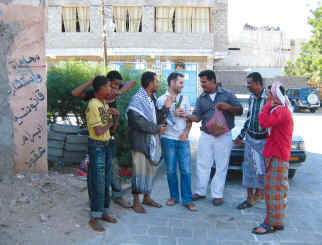 |
|
The author being offered qat leaves during a visit to the former Ion Keith-Falconer Hospital in Shaykh Othman. |
| |
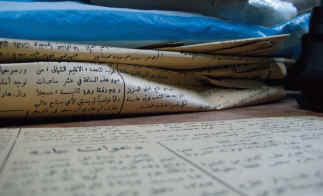 |
|
A pile of copies of Fatat al-Jazirah newspapers in the Hanbala Archive Centre. |
| |
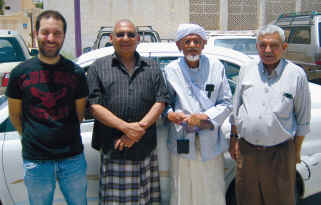 |
| The author with (from left to right) Muhammad Mubarak Bin Dohry, Sayyid Ja’afar bin
Muhammad al-Saqqaf (scholar and historian) and Khamis Ali Hamdan in Say’un. |
| |
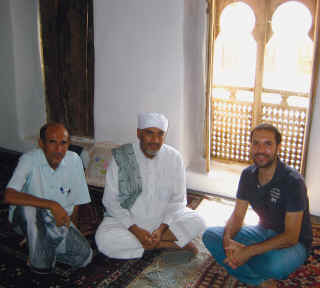 |
The author with (from left to right) Najib Sa’id Ba Wazir (writer and poet) and Sayyid
Muhammad bin Hassan al-Saqqaf, Director, at the Ibn Ubaidillah al-Saqqaf Centre, Say’un. |
| |
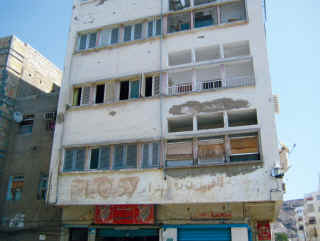 |
| FLOSY slogan (‘Liberation Front ... Revolution for the Poor’) preserved on a building in
Aydarus Street, Crater, Aden. |
Vol
19. 2011
|
